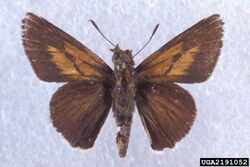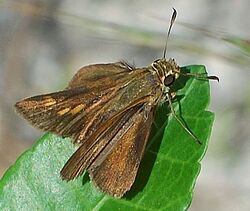Biology:Euphyes arpa
| Euphyes arpa | |
|---|---|

| |

| |
| Scientific classification | |
| Kingdom: | |
| Phylum: | |
| Class: | |
| Order: | |
| Family: | |
| Genus: | |
| Species: | E. arpa
|
| Binomial name | |
| Euphyes arpa (Boisduval & Le Conte, [1837])[2]
| |
| Synonyms | |
| |
Euphyes arpa, the palmetto skipper, is a butterfly of the family Hesperiidae.
Description
The wingspan is 41–49 mm. The head and front of thorax are bright orange.[4] The upperside of the forewings is reddish yellow with black borders in males and mostly black with a few reddish-yellow patches in females.[4] The underside of the hindwings is bright yellow orange without markings in both males and females.[4]
Ecology
The larvae feed on the fronds of the palm species Serenoa repens, the saw palmetto, and live in silken tubes at the frond base.[4] The species overwinters in the larval stage.[4]
Adults feed on flower nectar from various plants, including the pickerelweeds (genus Pontederia).[4] Adult males perch in sedge marshes to await females.[4]
Habitat is generally moist with low palmetto scrub, including open pine flats, and forested scrub/shrub wetlands, with a necessary abundance of saw palmetto.[1][5]
Range
E. arpa is found in most of Florida, and immediately adjacent Georgia, Alabama, and Mississippi, possibly established resident only in Florida and Mississippi.[1]
Brood
Adults occur in most of Florida from about March to November, apparently with several broods per year.[1]
Conservation status
The species has not been assessed for the IUCN Red List.[6] NatureServe ranks the species with a rounded global conservation status of G3: vulnerable.[1] The species may be extirpated in the Florida Keys.[1]
References
- ↑ 1.0 1.1 1.2 1.3 1.4 1.5 Schweitzer, DF (2004). "Comprehensive Report Species – Euphyes arpa". NatureServe Explorer. NatureServe Inc.. http://www.natureserve.org/explorer/servlet/NatureServe?searchName=Euphyes+arpa. Retrieved 1 January 2014.
- ↑ "Euphyes arpa". Integrated Taxonomic Information System. https://www.itis.gov/servlet/SingleRpt/SingleRpt?search_topic=TSN&search_value=666645. Retrieved 1 January 2014.
- ↑ Euphyes at funet
- ↑ 4.0 4.1 4.2 4.3 4.4 4.5 4.6 "Butterflies and Moths of North America". http://www.butterfliesandmoths.org/species/Euphyes-arpa. Retrieved 1 January 2014.
- ↑ Allen, Thomas J. (2005). A Field Guide to Caterpillars. Oxford University Press. p. 142. ISBN 978-0-19-803413-1. https://books.google.com/books?id=SS6s7tck0fIC&pg=PA142.
- ↑ "The IUCN Red List of Threatened Species". International Union for Conservation of Nature and Natural Resources. http://www.iucnredlist.org/. Retrieved 18 December 2013. (Search for Euphyes arpa to verify non-assessment).
External links
- Watercolor of larval, chrysalis and adult forms by John Abbott:
- Boisduval, Jean; LeConte, John (1833) (in French). Histoire générale et iconigraphie des lépidoptè et des chenilles de l'Amérique septentrionale. 1. Paris: Librairie Encyclopédique De Roret. p. 363 (plate 68). https://books.google.com/books?id=3rtTAAAAcAAJ&pg=PA363.
Wikidata ☰ Q5410730 entry
 |


